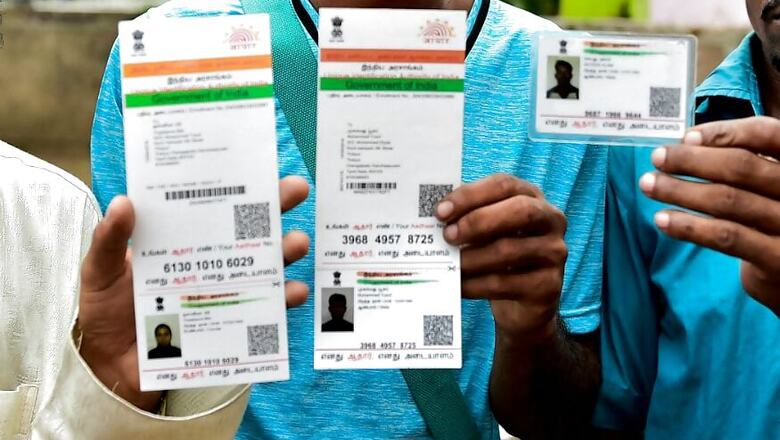
views
New Delhi: Most adults in the country have an Aadhaar card and trust that their biometric data is safe, the first detailed household survey on the unique ID system has revealed.
The ‘State of Aadhaar: A People’s Perspective’ report by Dalberg, a leading social impact advisory group, also highlighted that 90% of people with Aadhaar incorrectly believe that providing the unique identity number is mandatory for bank accounts despite the Supreme Court ruling of 2018.
The survey report reveals how people experience Aadhaar and the sentiments and trust in its use. It also shows which aspects of Aadhaar are working and which are not. The report, funded by the Omidyar Network India, was launched in New Delhi on Monday.
Around 80% of people with an Aadhaar card also believe the unique identity has made government subsidies, such as rations and pensions, more reliable, the report said.
According to the survey, since the Aadhaar biometric identification system was launched in 2009, it has covered 95 per cent of adults and 75 per cent children in India.
While the enrolment was mostly at par in most states, there were two notable exceptions – Assam and Meghalaya, where 90 per cent and 61 per cent residents do not have Aadhaar respectively. “People in Assam found it most difficult to enroll in Aadhaar,” the report said.
The low enrolment in Assam comes amid the National Register of Citizens exercise aimed at identifying illegally residing persons in the state. On August 31, 2019, the NRC exercise published its final list of citizens, excluding 19 lakh persons.
Besides the low enrolment in north eastern states into context, the report also revealed that 33 per cent of people who tried to update their Aadhaar found the process to be difficult. “One in five did not succeed,” it said.
Around 8 per cent of the population or 103 million people still do not have Aadhaar, the survey found. “The majority of these (73 per cent or an estimated 75 million) were children, of which one-third were under the age of five,” it noted. Three percent of adults or an estimated 28 million are also included in this figure.
“The research is not an attempt to adjudicate the ultimate merits of Aadhaar. It is about taking residents' perspectives into account to help better design and implement Aadhaar. We believe Aadhaar’s success will ultimately depend on how well the program can learn from the experiences and concerns of those who use or are not yet able to use Aadhaar in their daily lives,” said Gaurav Gupta, Dalberg’s Asia regional director and one of the authors of the study.
Currently, 1.2 billion people have the Aadhaar card. The State of Aadhaar revealed additional details of the Aadhaar’s usage. Close to 39 per cent of people give their Aadhaar linked biometrics regularly to receive rations leading to the dependency of 29 per cent households in the country to receive their monthly supplies.
In terms of finance, 72 per cent of adults in the country have linked their bank accounts to Aadhaar, with 87 per cent of all bank accounts linked to the unique ID system. Not only finance, the Aadhaar is also used by 47 per cent of children to enroll themselves in schools using their own or their parent’s ID.
Delivery of welfare or social services in agriculture has also been impacted by Aadhaar. Ninety per cent farmers in the country have given their Aadhaar at least once for their fertilizer subsidy, the survey revealed. Interestingly, the survey has also found that 41 per cent of adults gave their Aadhaar for a new SIM connection.
Although the Aadhaar has been unanimously accepted in the country as a one-stop ID, Justice Srikrishna, head of the Expert Committee constituted by the Ministry of Information and Technology that submitted its report and proposed the Draft Personal Data Protection Bill, said the government may have to be wary of the way it is implemented.
“Conceptually the idea of Aadhar is brilliant. The only problem is there in implementation. Implementation is horrendous. What worries me is the linking of the Aadhar with other services. We need guard to India against this,” he said at the launch of the report.
The State of Aadhar is based on findings from two national surveys on Aadhaar that gathered the experiences and perspectives of over 167,000 residents in India. This data represents the largest primary dataset on the use of digital ID in the world, the report said.
It based its findings on the unique methodology adopted in the survey. A 10-minute survey with 147,868 respondents across 28 states and 45-minute in-depth survey with 19,209 respondents across 16 states was conducted to gather primary data for the report.
The survey, for the first time, has also been able to quantify the variable of trust. “Ninety-two per cent of people are satisfied with Aadhaar, while 67 per cent of people who have been excluded from a service due to problems with Aadhaar still say they are satisfied,” it noted.
The trust on Aadhaar is primarily due to the fact that it keeps data safe, prevents others from accessing government benefits, the respondents said. Among Aadhaar’s primary uses are in availing LPG subsidy (92 per cent), social pensions (88 per cent), benefits under the Centre’s Mahatma Gandhi National Rural Employment Guarantee Scheme (77 per cent) and the Ayushman Bharat scheme (74 per cent).
For persons in the margins of society, the Aadhaar is also their first ID ever created, especially the third gender, homeless people and women. Forty-seven per cent of them have used to create a bank account, while 38 per cent of persons have used it to get a SIM card, the survey revealed.

















Comments
0 comment